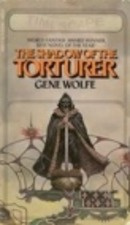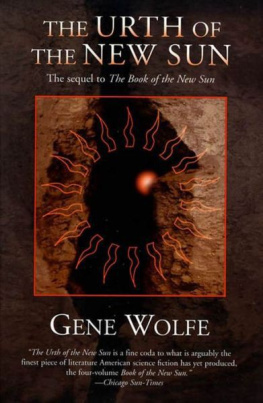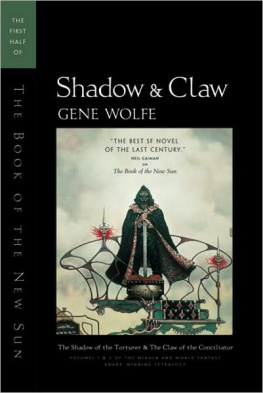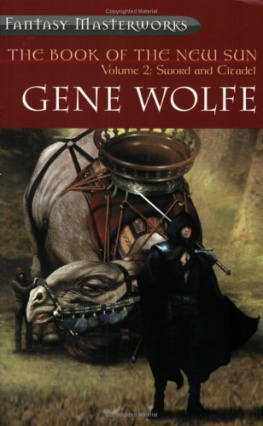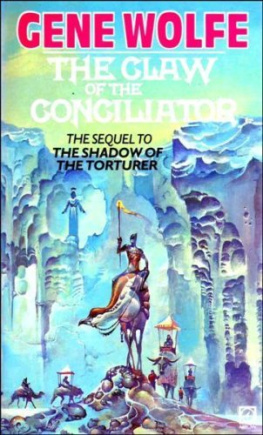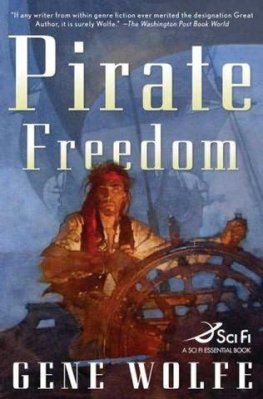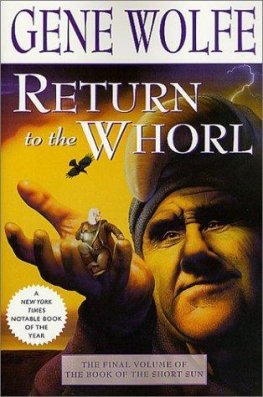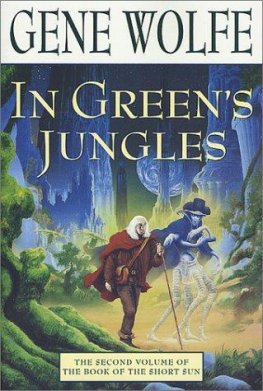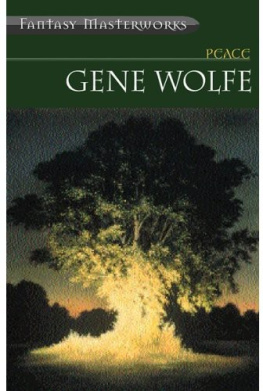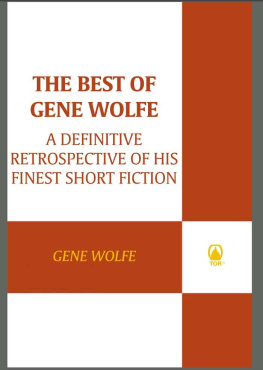Gene Wolfe - The Shadow Of The Torturer
Here you can read online Gene Wolfe - The Shadow Of The Torturer full text of the book (entire story) in english for free. Download pdf and epub, get meaning, cover and reviews about this ebook. year: 1981, publisher: Simon and Schuster, genre: Detective and thriller. Description of the work, (preface) as well as reviews are available. Best literature library LitArk.com created for fans of good reading and offers a wide selection of genres:
Romance novel
Science fiction
Adventure
Detective
Science
History
Home and family
Prose
Art
Politics
Computer
Non-fiction
Religion
Business
Children
Humor
Choose a favorite category and find really read worthwhile books. Enjoy immersion in the world of imagination, feel the emotions of the characters or learn something new for yourself, make an fascinating discovery.
- Book:The Shadow Of The Torturer
- Author:
- Publisher:Simon and Schuster
- Genre:
- Year:1981
- Rating:5 / 5
- Favourites:Add to favourites
- Your mark:
- 100
- 1
- 2
- 3
- 4
- 5
The Shadow Of The Torturer: summary, description and annotation
We offer to read an annotation, description, summary or preface (depends on what the author of the book "The Shadow Of The Torturer" wrote himself). If you haven't found the necessary information about the book — write in the comments, we will try to find it.
The Shadow Of The Torturer — read online for free the complete book (whole text) full work
Below is the text of the book, divided by pages. System saving the place of the last page read, allows you to conveniently read the book "The Shadow Of The Torturer" online for free, without having to search again every time where you left off. Put a bookmark, and you can go to the page where you finished reading at any time.
Font size:
Interval:
Bookmark:
Chapter1
RESURRECTIONAND DEATH
It is possibleI already had some presentiment of my future. The locked and rusted gate thatstood before us, with wisps of river fog threading its spikes like the mountainpaths, remains in my mind now as the symbol of my exile. That is why I havebegun this account of it with the aftermath of our swim, in which I, thetorturer's apprentice Severian, had so nearly drowned.
"Theguard has gone." Thus my friend Roche spoke to Drotte, who had alreadyseen it for himself.
Doubtfully,the boy Eata suggested that we go around. A lift of his thin, freckled armindicated the thousands of paces of wall stretching across the slum andsweeping up the hill until at last they met the high curtain wall of theCitadel. It was a walk I would take, much later.
"And tryto get through the barbican without a safe-conduct? They'd send to MasterGurloes."
"But whywould the guard leave?"
"Itdoesn't matter." Drotte rattled the gate. "Eata, see if you can slipbetween the bars."
Drotte was ourcaptain, and Eata put an arm and a leg through the iron palings, but it wasimmediately clear that there was no hope of his getting his body to follow.
"Someone'scoming," Roche whispered. Drotte jerked Eata out. I looked down thestreet. Lanterns swung there among the fog-muffled sounds of feet and voices. Iwould have hidden, but Roche held me, saying, "Wait, I see pikes."
"Do youthink it's the guard returning?"
He shook hishead. "Too many."
"A dozenmen at least," Drotte said.
Still wet fromGyoll we waited. In the recesses of my mind we stand shivering there even now.Just as all that appears imperishable tends toward its own destruction, thosemoments that at the time seem the most fleeting recreate themselvesnot only inmy memory (which in the final accounting loses nothing) but in the throbbing ofmy heart and the prickling of my hair, making themselves new just as ourCommonwealth reconstitutes itself each morning in the shrill tones of its ownclarions.
The men had noarmor, as I could soon see by the sickly yellow light of the lanterns; but theyhad pikes, as Drotte had said, and staves and hatchets. Their leader wore along, double-edged knife in his belt. What interested me more was the massivekey threaded on a cord around his neck; it looked as if it might fit the lockof the gate.
Little Eatafidgeted with nervousness, and the leader saw us and lifted his lantern overhis head. "We're waiting to get in, goodman," Drotte called. He wasthe taller, but he made his dark face humble and respectful.
"Notuntil dawn," the leader said gruffly. "You young fellows had betterget home."
"Goodman,the guard was supposed to let us in, but he's not here."
"Youwon't be getting in tonight." The leader put his hand on the hilt of hisknife before taking a step closer. For a moment I was afraid he knew who wewere.
Drotte movedaway, and the rest of us stayed behind him. "Who are you, goodman? You'renot soldiers."
"We'rethe volunteers," one of the others said. "We come to protect our owndead."
"Then youcan let us in."
The leader hadturned away. "We let no one inside but ourselves." His key squealedin the lock, and the gate creaked back.
Before anyonecould stop him Eata darted through. Someone cursed, and the leader and twoothers sprinted after Eata, but he was too fleet for them. We saw histow-colored hair and patched shirt zigzag among the sunken graves of paupers,then disappear in the thicket of statuary higher up. Drotte tried to pursuehim, but two men grabbed his arms.
"We haveto find him. We won't rob you of your dead."
"Why doyou want to go in, then?" one volunteer asked.
"Togather herbs," Drotte told him. "We are physicians' gallipots. Don'tyou want the sick healed?"
The volunteerstared at him. The man with the key had dropped his lantern when he ran afterEata, and there were only two left. In their dim light the volunteer lookedstupid and innocent; I suppose he was a laborer of some kind. Drotte continued,"You must know that for certain simples to attain their highest virtuesthey must be pulled from grave soil by moonlight. It will frost soon and killeverything, but our masters require supplies for the winter. The three of themarranged for us to enter tonight, and I borrowed that lad from his father tohelp me."
"Youdon't have anything to put simples in."
I still admireDrotte for what he did next. He said, "We are to bind them in sheaves todry," and without the least hesitation drew a length of common string fromhis pocket.
"Isee," the volunteer said. It was plain he did not. Roche and I edgednearer the gate.
Drotteactually stepped back from it. "If you won't let us gather the herbs, we'dbetter go. I don't think we could ever find that boy in there now."
"No youdon't. We have to get him out."
"Allright," Drotte said reluctantly, and we stepped through, the volunteersfollowing. Certain mysteries aver that the real world has been constructed by thehuman mind, since our ways are governed by the artificial categories into whichwe place essentially undifferentiated things, things weaker than our words forthem. I understood the principle intuitively that night as I heard the lastvolunteer swing the gate closed behind us.
A man who hadnot spoken before said, "I'm going to watch over my mother. We've wastedtoo much time already. They could have her a league off by now." Severalof the others muttered agreement, and the group began to scatter, one lanternmoving to the left and the other to the right. We went up the center path (theone we always took in returning to the fallen section of the Citadel wall) withthe remaining volunteers.
It is mynature, my joy and my curse, to forget nothing. Every rattling chain andwhistling wind, every sight, smell, and taste, remains changeless in my mind,and though I know it is not so with everyone, I cannot imagine what it can meanto be otherwise, as if one had slept when in fact an experience is merely remote.Those few steps we took upon the whited path rise before me now: It was coldand growing colder; we had no light, and fog had begun to roll in from Gyoll inearnest. A few birds had come to roost in the pines and cypresses, and flappeduneasily from tree to tree. I remember the feel of my own hands as I rubbed myarms, and the lantern bobbing among the steles some distance off, and how thefog brought out the smell of the river water in my shirt, and the pungency ofthe new-turned earth. I had almost died that day, choking in the netted roots;the night was to mark the beginning of my manhood.
There was ashot, a thing I had never seen before, the bolt of violet energy splitting thedarkness like a wedge, so that it closed with a thunderclap. Somewhere a monumentfell with a crash. Silence then... in which everything around me seemed todissolve. We began to run. Men were shouting, far off. I heard the ring ofsteel on stone, as if someone had struck one of the grave markers with abadelaire. I dashed along a path that was (or at least then seemed) completelyunfamiliar, a ribbon of broken bone just wide enough for two to walk abreastthat wound down into a little dale. In the fog I could see nothing but the darkbulk of the memorials to either side. Then, as suddenly as if it had beensnatched away, the path was no longer beneath my feetI suppose I must havefailed to notice some turning. I swerved to dodge an oblesque that appeared toshoot up before me, and collided full-tilt with a man in a black coat.
He was solidas a tree; the impact took me off my feet and knocked my breath away. I heardhim muttering execrations, then a whispering sound as he swung some weapon.Another voice called, "What was that?"
"Somebodyran into me. Gone now, whoever he was."
I lay still.
A woman said,"Open the lamp." Her voice was like a dove's call, but there wasurgency in it.
Next pageFont size:
Interval:
Bookmark:
Similar books «The Shadow Of The Torturer»
Look at similar books to The Shadow Of The Torturer. We have selected literature similar in name and meaning in the hope of providing readers with more options to find new, interesting, not yet read works.
Discussion, reviews of the book The Shadow Of The Torturer and just readers' own opinions. Leave your comments, write what you think about the work, its meaning or the main characters. Specify what exactly you liked and what you didn't like, and why you think so.

